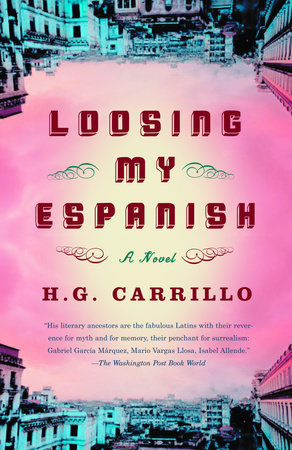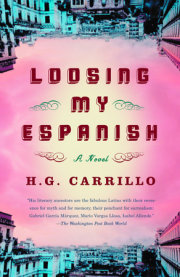Doña Liliana once danced the merengue at the Tropicana in a dress so red, so thin, so tight–tan sexy, they said, they said–you would have thought you had died and gone to heaven. Béseme chica; Béseme; Besitos, besitos, they said they all begged, they all wolf-whistled, they all sucked their teeth, and fanned themselves with napkins as she passed their tables. They disagreed as to what it was she wore that reminded them of jasmine; of vanilla; of orange peel; of bergamot, was the story that doña Cristina never told.
What did you do before you came to the United States, the social worker asked doña Liliana though she was looking at me. Without waiting for my translation, doña Liliana answered, Era una revolucionaria. Dígale, mijo, she insisted, tell her I bore the babies of the revolution.
Amá gasped.
¡Liliana, no! doña Cristina cried.
Mira, doña Liliana said gesturing like the women she’d seen caressing cars and washing machines on television toward Julio y Roman ¿Ellos no son muy hermosos, no?
And while doña Liliana fell over herself in laughter, Amá brought the social worker a fresh cafecito even though the woman hadn’t touched the first; doña Cristina put another pastelito on the woman’s plate next to the first, though both sat there until later; after she had left, Julio would lick them both so that neither Román nor I would ask for them.
Tell her, mijo, doña Liliana said, smiling, wiping her tears, tell her, what do I have to lose anyway?
Here, in a place where she had to be either Mexican or Puerto Rican, she was abruptly disinherited from her own beauty and privilege, or the beauty that was her privilege that no longer brought about entrée or absolution. How would I know if I can still turn heads when I walk into a room, I once overheard her telling doña Cristina, when I have no idea who or what they see when they see me.
It seems like the long-ago-and-far away sort of time, yo lo sé, señor Ostrovski, pero there was a time when all she needed to do was turn to the society page in El Diario de la Marina or Havana Post with her morning coffee to find out who she was the night before. What she wore. On whose arm was she seen. Daughter of Industrialist, each article starts in the spectral drift of microfiche. Sometimes they weren’t even complete articles, señores, go to any library that has Cuban papers on file from the 1950’s: Daughter of prominent Cuban Industrialist, next to advertisements for Hiel de Vaca from Crusellas and Kolonia with a K was delicate to the skin, seen in a sequined Dior gown; at The Ballet; on the steps of the opera house; at the opening of a pavilion; and of course, there were the great numbers of coming out parties; charity dances; Señorita Liliana–daughter of one of our most prominent industrialists–qué bonita; lovely as could be imagined; reviving the scalloped neckline; clutching a spray of veronica and pink roses; accompanied the son of, the newly appointed, the up-and-coming, the next.
Until one evening, the Havana Post announced Batista had left the country.
None of you, señores, I realize, or for at least most of you, the fact that the President had left the country is somewhat unfathomable. For you, presidents–whether or not you happen to agree with their politics or not; whether you happen to know who they are or not for that matter, señor Chávez–are like fixtures and to have one suddenly leave the country would be the same as if you woke to find your street had turned into a river and you and your bed was floating headed toward the lake; shifts of who and what, when and where are so much less likely here; it’s an easy, landlocked feeling —-in the middle of the country–this, where everything is hemmed in just so.
But the cubanos who woke up to find themselves still surrounded by water had become somewhat accustomed to the idea that their president was a mutable shape-changer able to appear anywhere.
Ask doña Cristina, she’ll tell you that they were all at a cocktail party–and this is only what she heard because she wasn’t there herself to witness it–but she says they said it was an early evening affair, right after dinner, before everyone was headed out to a dance so they were all in formal dress, meaning, because it was right before spring in La Habana, white gloves for the women, and the men would have been wearing white dinner jackets following the trend set by Hollywood at the time that April in 1952 when all anyone could talk about was Batista on the cover of Time
Magazine. Standing in front of the Cuban Flag, the caption read, Cuba’s Batista: he got past Democracy’s sentries, the daughter of an American business partner of doña Liliana’s father translated for all that bothered to pay attention. But hardly anyone bothered to pay attention, for there were cucumber sandwiches and someone had just come back from a trip that started in New York and ended in California with a stack of records and a recipe for daiquiris. And besides, for those who did last night’s reading–and why do we bother kidding ourselves at this stage of the game, señores, with days like this, hot days, linked one after another, that seem to have plunged us into the middle of summer; unearned days that render daydreams of beaches, bring about the smell of sand, sea and suntan lotion, that take you outside of the confinement of classrooms and institutional disinfectant and chalk dust something like a northerly wind, a hurricane of change and destruction, everything leveled and readied for a cloudless sky, the sound of waves, and the giggles that come from the scantly clad bodies that you imagine when you imagine, but of course, none of you imagine, but if you were to, how warm and moist, how slick with sweat are they; but the real question is where are they; are they part of some past beach or one in the future, entonces they surely are not here–the reading would have placed you somewhere between there and here.
Señores, for the few of you that joined the party last night and for those who would like to join us on the other side now, it’s a thin membrane that you all use to get to the beach or to the arms you rest in right now or to another morning, another time, in another place.
Leave your towels, the cooler with its sandwiches and beer, the umbrella there on the sand. They’ll be there when we come back.
Vamos.
Copyright © 2004 by H.G. Carrillo. All rights reserved. No part of this excerpt may be reproduced or reprinted without permission in writing from the publisher.








